Technology

Magic Darts or, when every throw is a perfect hit
Andreas Stelzer (AT), Rudolf Scheidl (AT)
Darts is a popular game, but difficult to master. In this version of darts, players always hit the bullseye. What looks like witchcraft is revealed as a mechatronic system, with a novel microwave sensor network and ultrafast hydraulic actors interacting. Such technologies will affect our future daily life, e.g. in self driving cars, with microwaves allowin us to see in the dark, with fog or dust; or in exoskeletons, where hydraulic actuation enables ultimate compactness.
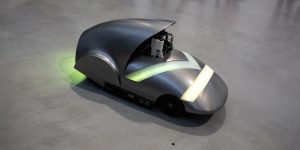
K – JKU’s Interactive Robocar
Institute for Machine Learning, LIT AI Lab, LIT Robopsychology Lab, Johannes Kepler University (AT); Inseq Design (AT)
K is a likeable little robocar: small in size, but very smart on board! Named after JKU’s famous patron, Johannes Kepler, it drives itself autonomously on changing terrain, can predict the movement patterns of pedestrians and playfully interacts with its environment.
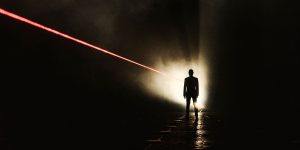
The Experimenta Garden - A Drone Opera (2015 – 2020)
Experimenta (AU)
The Experimenta Garden features the multi-platform work A Drone Opera (2015 – 2020)
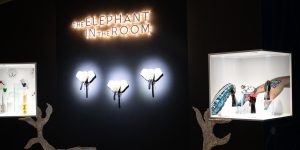
The Elephant in the Room
Melanie Baumgartner (AT), Florian Hartmann (AT), David Preninger (AT)
Nature-inspired robotics is collaborative, adaptable and ecological. With biodegradable and edible materials, new technologies that interact sustainably with humans and nature emerge. Imitations of an elephant's trunk embody such soft nature-inspired robots and interact quite naturally with visitors in Kepler's Gardens.
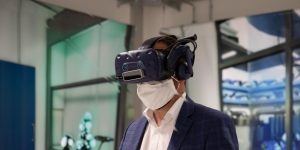
Robots Talking To Me
LIT Robopsychology Lab, Johannes Kepler University (AT)
How should robots communicate with people? What voice makes AI assistants sound trustworthy? Do we even have to listen to robots or should we always be in command ourselves? Under the title *Robots Talking to Me*, the *LIT Robopsychology Lab* presents four installations that give tangible expression to questions of human-machine relationships and invite participation.
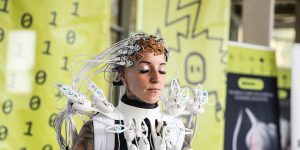
The Pangolin Scales
Thomas Faseth (AT), Harald Pretl (AT), Christoph Guger (AT), Anouk Wipprecht (NL)
The Pangolin Scales demonstrates the world’s first 1.024 channel brain-computer interface (BCI), which is able to extract information from the human brain with an unprecedented resolution to control an interactive, fashionable dress.
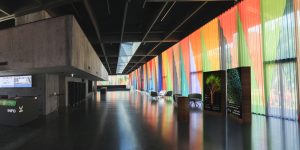
Treeversity
Johann Höller (AT), Thomas Lorenz (AT), Florian Gruber (AT), Ursula Niederländer (AT), Tanja Illetits-Motta (AT), Raphael Blasi (AT), Andreas Rösch (IT), Stefan Küll (AT)
Treeversity focuses on the relation between Big Data and data visualization to convey complex information at a glance. A mirror of the university’s inner workings, diligently recording success, failure and evolution. A portrait of its life in the form of a tree. Courses, grades and exams become branches, creating many different trees. Fully grown or nascent, withering or growing erratically. Treeversity shows the university as a forest, providing a tool to analyze its mechanisms at the same time.
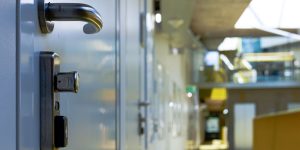
Exposed Building
Michael Roland (AT), Michael Mayr (AT), Robert Holzinger (AT), Markus Vogl (AT)
By opening a maintenance hatch and hacking into the network infrastructure behind it, we acquire access to the electronic locking system. By controlling the buzzers built into the office door locks, we transform the Science Park 2 building into an orchestra and it resounds like a huge walk-in instrument. The installation playfully provokes thought about the vulnerability of modern technology and its growing risks for society.
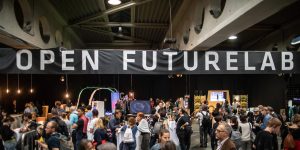
Open Futurelab Exhibition
The Open Futurelab Exhibition showcases the current research approaches and projects by the Ars Electronica Futurelab – Ars Electronica's Research and Development department.
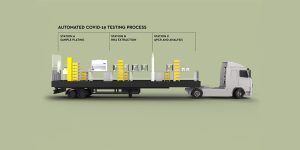
CONTAIN - Mobile COVID19 Emergency Testing Facilities
Open Cell (UK)
CONTAIN units are rapidly deployable COVID-19 testing laboratories housed in shipping containers. The design allows transportation to any location through standard shipping services. Automated RT-qPCR protocols can deliver 2,400 tests per unit in 24 hours.
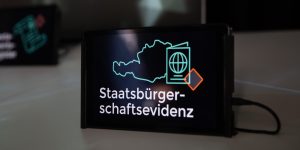
Digital Government in a Box
LIT Law Lab, Johannes Kepler University (AT)
From the “transparent citizen” and “social scoring” to AI-supported truth finding in the courtroom and machine-generated administrative notices: the digitization of administration and jurisdiction has many facets. It requires not only a consideration of what is technically possible, but also of what is legally permissible and what is desired in terms of legal policy. Against this background, the LIT Law Lab has two installations dedicated to the legal framework conditions (fundamental rights and data protection), problems and proposed solutions for a digitized enforcement.

Al truth machine
LIT Law Lab, Johannes Kepler Universität (AT)
From the “transparent citizen” and ”social scoring” to AI-supported truth finding in the courtroom and machine-generated administrative notices: the digitization of administration and jurisdiction has many facets. It requires not only a consideration of what is technically possible, but also what is legally permissible and what is desired in terms of legal policy. Against this background, the LIT Law Lab has two installations dedicated to the legal framework conditions (fundamental rights and data protection), problems and proposed solutions for a digitized enforcement.
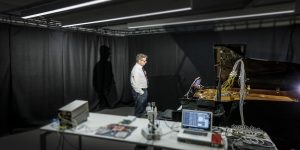
Biocomputer Rhythms
Interdisciplinary Centre for Computer Music Research (ICCMR), University of Plymouth (UK), Eduardo Reck Miranda (BR/UK)
Biocomputer Rhythms is a piece for prepared piano and percussion. It is a musical duet between a pianist and an intelligent interactive biocomputer. The biocomputer listens to the piano and produces musical responses during the performance. The responses are played on percussion instruments and on the piano by the pianist. The piano is prepared with electromagnetic actuators positioned inside the instrument to vibrate its strings. Electromagnetic actuators are also used to vibrate percussion instruments.
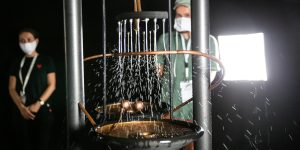
Dancing Water
Leon Kainz (AT)
This installation is based on a simple physical principle: the generation of electrostatic charges using water. The charged water droplets whirl in dynamic tracks around copper rods and react to nearby bodies. The collected charge can make a light bulb glow and generate flashes of lightning that can be centimetres long.
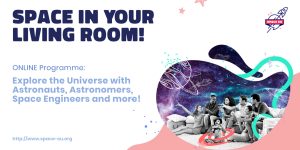
The Step into Space Garden
Leiden University (NL)
The Step into Space Garden is a journey of discovery through the story of space and your part in it. It presents online and in person events bring together space sciences and arts, through exhibitions and participatory activities with a focus on projects by and for youth.
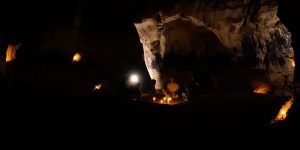
Finding Amir / From Jerusalem to the Judaea Desert, Israel
Musrara, the Naggar School of Art and Society (IL)
The day that Covid19 sent us all into isolation, Amir Meir, a member of the Musrara Sonic Art Research Group׳ announced he was going to spend the quarantine in one of the many caves in the Judean Desert near Jerusalem and disappeared ever since. With the aid of space and sound illusions practices, the film "Finding Amir" tries to touch on the in-depth questions about the imagined realities that lie behind the walls of digital and symbolic representation.
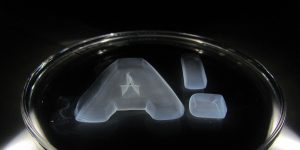
Chronicles of an Art and Science Collaboration, Otaniemi-Espoo, Finland
Aalto University (FI)
The project highlights the use of autoethnographic narrative as tool for artistic and design research. It brings together self-reflections from three scientists who participated in an art and science collaboration dealing with the use of bio-cellulose for art and design purposes. Through their stories we learn about what inspired them to follow careers in science and how the making of a contribution to sustainability and the good of humankind sustains their work objectives.
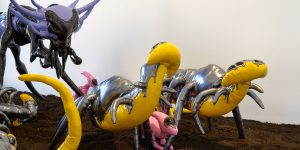
A glimpse into the cultural capital program
European Capital of Culture Esch2022 (LU)
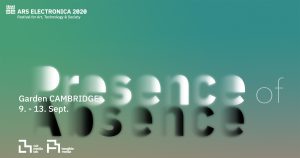
Presence of Absence
Tangible Media Group | MIT Media Lab (US)
The Cambridge Garden by Tangible Media Group for Ars Electronica Festival 2020, we will be featuring selected projects that materialize the Presence of Absence. Our garden introduces the latest in Tangible Telepresence research to engage people who collaborate across time and space with synchronized tangibles. We also feature a variety of dynamic computational materials we call Radical Atoms that foster a new form of human-material interactions.
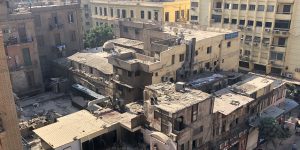
WE ARE DATA
Cairotronica (EG)
WE ARE DATA came as a response to a rising responsibility placed on "technology" as a tool which facilitates inclusive development and solutions to many challenges currently facing cities like Cairo. This, in turn, raises questions about security, privacy, accountability, bias, agency, transparency, and ethics among many others. Through the We Are Data fellowship, we wanted to encourage dialogue on the complexity of technology and data from the perspective of 6 Egyptian artists.


